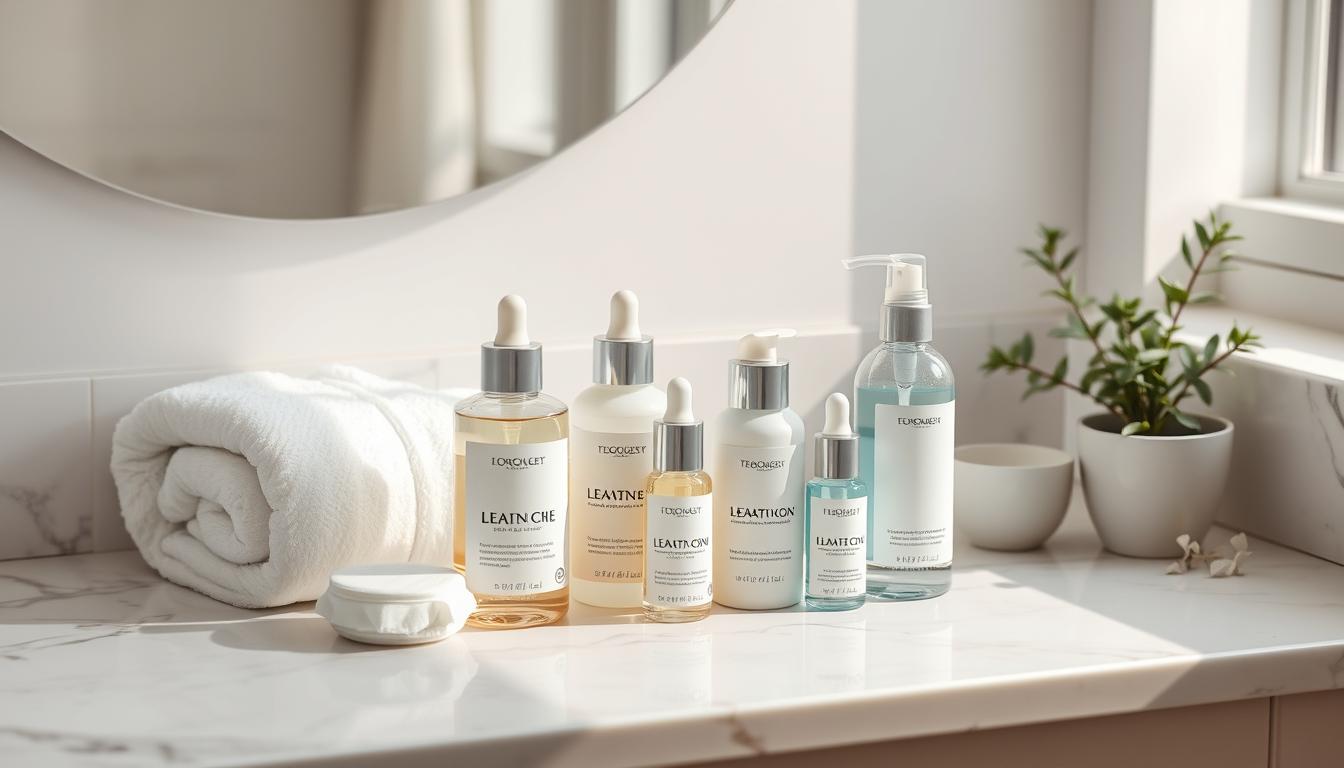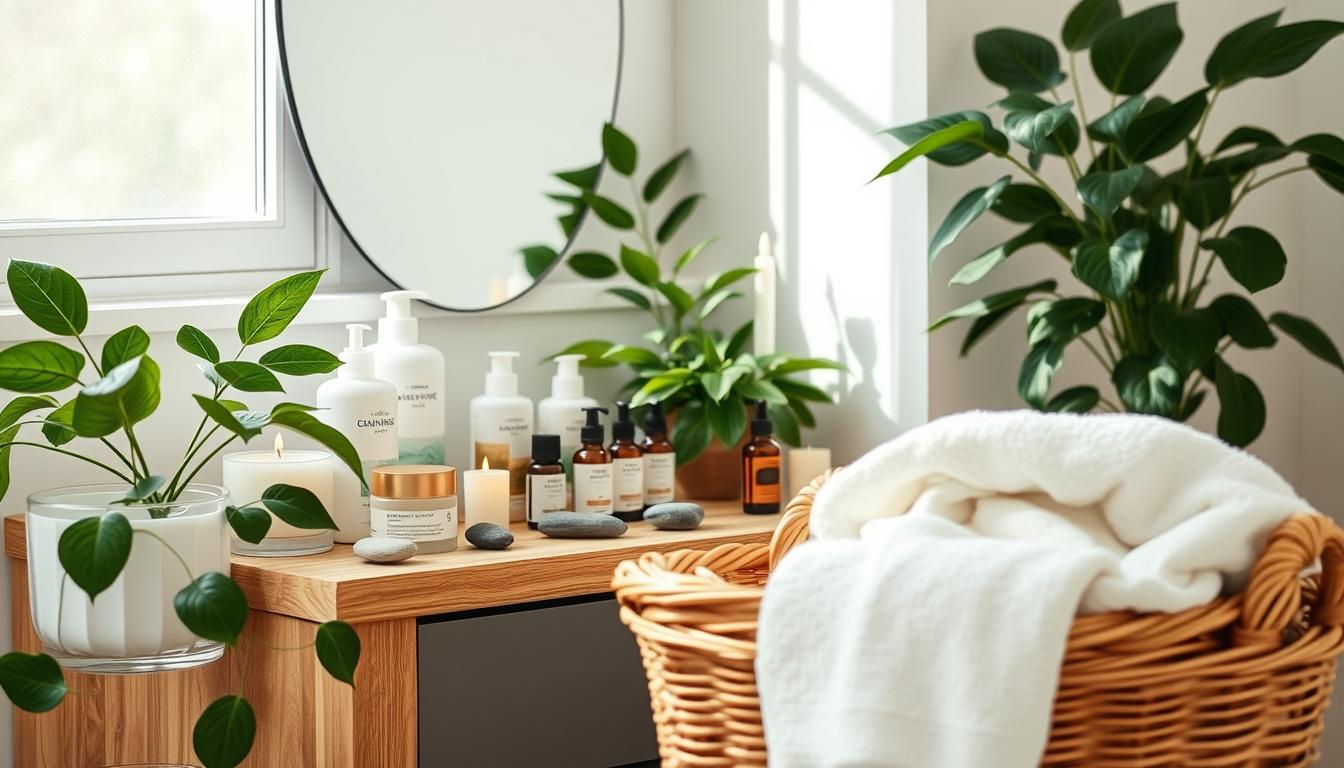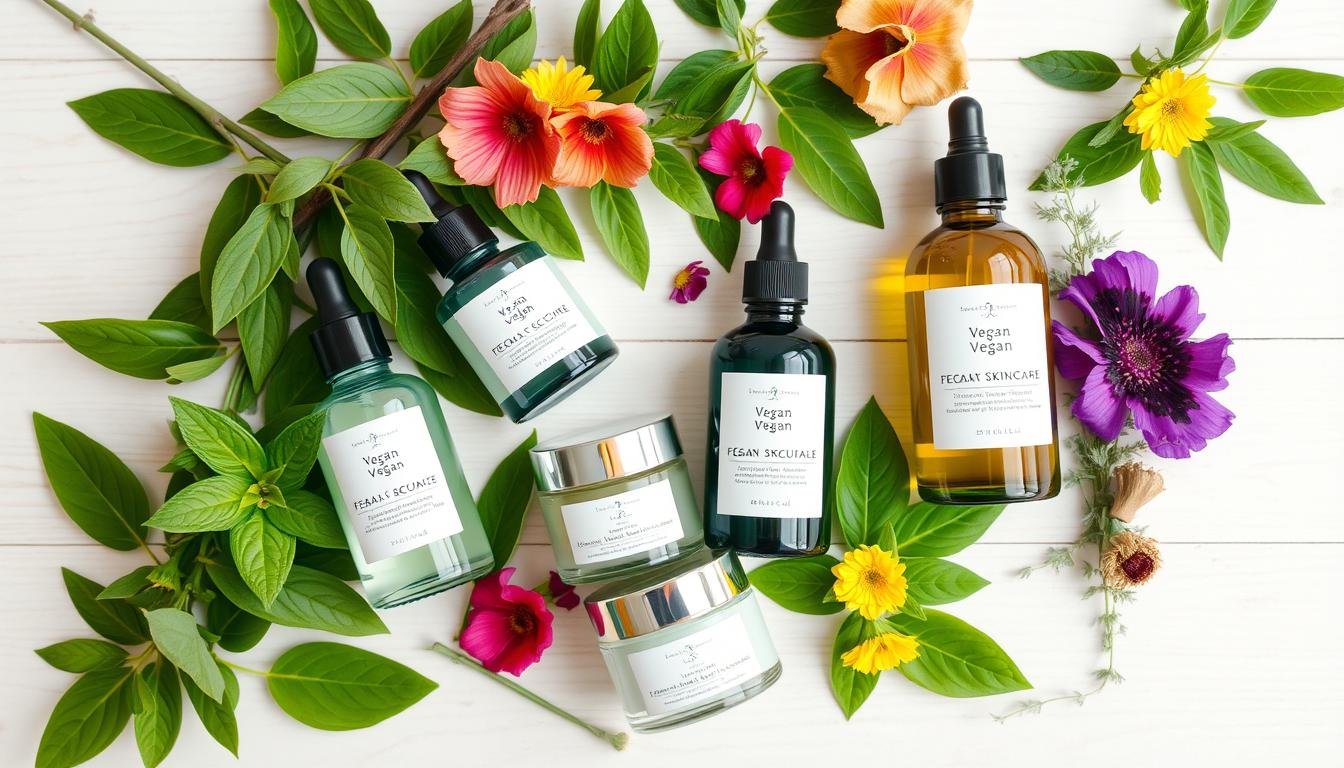Sensitive Skin Care Tips: Nurture Your Delicate Skin

Sensitive Skin Care Tips needs gentle care to stay calm and healthy. This article shares tips to help you care for your delicate skin. You’ll learn about the causes of skin sensitivity and how to manage it.
It also guides you in creating a gentle skincare routine. This way, you can take good care of your sensitive skin.
Key Takeaways
- Sensitive skin requires specialized care to maintain its health and radiance
- Understanding the causes and triggers of skin sensitivity is crucial for effective management
- Developing a gentle, personalized skincare routine is essential for sensitive skin
- Addressing common sensitive skin issues, such as redness and dryness, is important for overall skin well-being
- Adopting a holistic approach that includes lifestyle and dietary changes can further support sensitive skin health
Understanding Sensitive Skin: Causes and Triggers
Sensitive skin is a common issue. It reacts strongly to many things, causing redness, irritation, and tightness. Knowing what causes and triggers this sensitivity is key to managing it and keeping your skin healthy.
Also Read : Effective Daily Skin Care Regimen For Oily Skin
Identifying Characteristics and Triggers of Sensitive Skin
Many things can set off sensitive skin. Harsh chemicals, fragrances, and certain fabrics are big culprits. Extreme temperatures and pollution can also harm the skin’s barrier, leading to irritant contact dermatitis or allergic contact dermatitis.
Also Read : Effective Acne Scar Treatment At Home Methods
The Biological Mechanisms Behind Skin Sensitivity
Genetics and environment play a big role in skin sensitivity. Some people are naturally more sensitive due to their genes. Environmental stressors like pollution and UV radiation can also weaken the skin barrier function, making it more prone to irritation and allergic reactions.
Also Read : Best Skincare Cleansers For Glowing Skin
Common Irritants and Allergens Affecting Sensitive Skin
Some ingredients and environmental factors can really upset sensitive skin. Harsh chemicals like sulfates and alcohol, and synthetic fragrances, are common irritants. Allergens such as pollen, pet dander, and certain foods can also cause sensitivity. To keep your skin calm, it’s best to avoid these triggers and use gentle, fragrance-free and hypoallergenic products.
Also Read : Effective Skin Care Routine With Tretinoin
| Common Irritants | Common Allergens |
|---|---|
| Sulfates | Pollen |
| Alcohol | Pet dander |
| Synthetic fragrances | Certain foods |
The Role of Genetics and Environment in Skin Sensitivity

Genetics and environment both play big roles in how sensitive our skin is. Some people are naturally more sensitive due to their genes. But, things around us can also affect our skin’s health and how well it holds up.
Also Read : How Can You Treat Dry Skin?
Knowing about genetic factors in sensitive skin is key to finding the right skincare. Some genes make us more likely to react to irritants, allergies, and inflammation. By figuring out your skin type, you can tackle the root causes of your sensitivity and protect your skin.
Don’t ignore the impact of environmental factors in sensitive skin either. Harsh chemicals, pollutants, extreme weather, and certain habits can make your skin react and get worse. By finding and avoiding your personal triggers, you can manage your sensitive skin better and create a skincare plan that works for you.
“Addressing the interplay between genetics and environment is the key to unlocking a healthier, more resilient complexion.”
A personalized skincare approach that looks at both genetics and environment is the best way to handle sensitive skin. By teaming up with dermatologists and skincare pros, you can learn what makes your skin special. Then, you can make a plan to keep your skin calm, comfortable, and glowing.
Sensitive Skin Care Tips: A Gentle Approach

Creating a gentle skincare routine is key for sensitive skin. Choose products that nourish and protect without causing irritation or allergic reactions.
Essential Steps in a Gentle Skincare Routine
Begin with a fragrance-free cleanser that gently removes dirt without drying out your skin. Next, use a lightweight, nourishing moisturizer made for sensitive skin to keep it hydrated and strong. Finish with a mineral-based, broad-spectrum sunscreen to shield your skin from UV rays.
Selecting the Right Products for Sensitive Skin
For sensitive skin, focus on hypoallergenic and fragrance-free products. Always do a patch test on a small area before using new products. This helps avoid any skin reactions and keeps your sensitive skin calm and healthy.
| Product Type | Recommended Features |
|---|---|
| Cleanser | Non-irritating, fragrance-free |
| Moisturizer | Lightweight, nourishing, sensitive skin-friendly |
| Sunscreen | Mineral-based, broad-spectrum, formulated for delicate skin |
By following these sensitive skin care tips and choosing the right products, you can create a gentle skincare routine. This will help keep your skin healthy, balanced, and glowing.
Managing Common Sensitive Skin Issues

Dealing with redness, irritation, and dryness can be tough for those with sensitive skin. But, the right approach and gentle ingredients can help. This can bring back comfort and glow to your skin.
Addressing Redness and Irritation
Redness and irritation are common in sensitive skin. They can be caused by many things, like the environment and certain products. To reduce these, look for skincare with soothing ingredients like aloe vera, chamomile, and green tea.
These natural ingredients have anti-inflammatory properties. They can help manage sensitive skin redness and calm sensitive skin irritation.
Replenishing Sensitive Skin Moisture
Dryness is another big issue for sensitive skin. The skin’s barrier might be weak, causing moisture loss. To replenish sensitive skin moisture, use hydrating ingredients like ceramides, glycerin, and hyaluronic acid.
“Treating sensitive skin requires a gentle, nourishing approach that addresses the root causes of redness, irritation, and dryness.”
Understanding your skin’s needs and using soothing ingredients for sensitive skin can help. This way, you can control common issues and get a healthier, more comfortable skin. A personalized and consistent routine is key.
Lifestyle and Diet for Sensitive Skin Health

Taking care of sensitive skin is more than just skincare. It’s about a whole approach that includes lifestyle and dietary habits. These can help your skin stay healthy and strong.
Things like stress management, adequate hydration, and eating foods rich in omega-3 fatty acids and antioxidants are key. They help keep your sensitive skin calm, balanced, and glowing.
Stress and Sensitive Skin
Too much stress can make skin sensitivity worse. It weakens the skin’s natural barrier. Try relaxation techniques like meditation, yoga, or deep breathing to manage stress. This supports your skin-healthy habits.
Hydration and Sensitive Skin
Drinking enough water is crucial for sensitive skin. It keeps the skin’s moisture balance and reduces irritation. Drink lots of water all day and use a humidifier in your home and office.
Dietary Considerations for Sensitive Skin
Eating a nutrient-rich diet is important. Include omega-3 fatty acids (like in salmon, walnuts, and flaxseeds) and antioxidants (from fruits and veggies). These can reduce inflammation and soothe sensitive skin. Stay away from spicy, processed, or high-sugar foods.
| Skin-Healthy Nutrients | Benefits for Sensitive Skin |
|---|---|
| Omega-3 Fatty Acids | Reduce inflammation and redness |
| Antioxidants (Vitamins C and E) | Protect against environmental stressors |
| Probiotics | Support a healthy gut-skin connection |
By adding these lifestyle and dietary habits to your daily life, you can support your sensitive skin‘s health and resilience.
Sensitive Skin Care Tips: A Holistic Approach

Taking care of sensitive skin means using gentle products and making lifestyle changes. This holistic sensitive skin care method helps your skin stay healthy and look great. It’s about knowing what irritates your skin, picking the right products, and living a healthy lifestyle.
Starting with comprehensive sensitive skin management means figuring out what your skin needs and what irritates it. Things like harsh chemicals, extreme temperatures, and pollution can make your skin sensitive. Knowing this helps you create a skincare routine that really helps your skin.
Adding integrative sensitive skin solutions to your daily life can greatly improve your skin’s health and look. This might include:
- Choosing gentle, fragrance-free skincare products that are free of harsh ingredients
- Incorporating soothing, hydrating ingredients like aloe vera, ceramides, and vitamin E
- Limiting exposure to environmental stressors such as harsh weather, air pollution, and harsh chemicals
- Adopting a balanced, nutrient-rich diet that supports skin health
- Managing stress levels through relaxation techniques and self-care practices
By taking a holistic approach to caring for your sensitive skin, you can achieve a healthier, more vibrant complexion. With the right skincare and lifestyle changes, you can get the sensitive skin wellness you’ve always wanted.
“Nurturing sensitive skin is a delicate balance, but with the right approach, you can unlock a radiant, resilient complexion.”
Embracing Your Sensitive Skin

Sensitive skin is special and strong. It’s time to see it as a beauty, not a flaw. By giving it gentle care, you can get a glowing skin that shows sensitive skin positivity.
Seeing your skin’s sensitivity as a sign of strength is key. It shows your skin is alert and healthy. This makes you proud of your skin care efforts and boosts your sensitive skin confidence.
Look at the good side of sensitive skin. Try gentle, hypoallergenic products that meet your skin’s needs. Enjoy pampering your skin with soothing ingredients that make it calm and radiant. It’s a way to show your skin you care.
“Sensitivity is not a flaw, it’s a superpower. Embrace it, and let your skin shine with confidence.”
Your sensitive skin makes you unique and beautiful. By accepting sensitive skin and celebrating sensitive skin, you’re not just caring for your skin. You’re also building self-love and acceptance. Let your sensitive skin confidence shine.
Also Read: What Are Common Types Of Skincare Treatment?
Conclusion
Caring for sensitive skin means using a gentle, tailored approach. It’s about understanding what makes your skin sensitive and choosing the right products. It also involves living a lifestyle that supports your skin’s health.
By doing these things, you can make your skin calm, radiant, and healthy. Take pride in the care you give your sensitive skin. It’s a special part of you.
Understanding your skin’s needs is key. Choose products that are gentle and non-irritating. A holistic approach that includes your lifestyle and diet is also important.
Empower yourself with knowledge about your skin. Be mindful of what it needs. This approach will make you feel confident and comfortable.
Your sensitive skin is a unique and valuable part of you. By caring for it, you can have a glowing, healthy complexion. Start this journey with self-care and self-acceptance.
Enjoy the benefits of a lifestyle that supports your sensitive skin. It will transform your skin and make you feel radiant from the inside out.
FAQs
Q: What are some effective tips for sensitive skin?
A: Some effective tips for sensitive skin include using gentle, fragrance-free skincare products, avoiding harsh ingredients, patch testing new products, and maintaining a consistent skin care routine. It’s also important to protect your skin from environmental factors and to keep it hydrated.
Q: What causes sensitive skin?
A: Causes of sensitive skin can vary widely and may include environmental factors, allergies, skin conditions, and underlying skin concerns. People with sensitive skin may also react adversely to certain skincare products, leading to irritated skin.
Q: How can I determine my skin type for better skincare?
A: To determine your skin type, consider factors like your skin’s moisture levels, oiliness, and how it reacts to different products. Common skin types include dry skin, oily skin, and combination skin. Understanding your skin type can help you choose the best skincare products for your unique needs.
Q: What should I include in my skincare routine for sensitive skin?
A: A skin care routine for sensitive skin should include gentle cleansing, moisturizing, and sun protection. Look for products designed for sensitive skin that are free from irritants. Additionally, consider incorporating soothing ingredients like aloe vera or chamomile.
Q: What are some skincare tips for sensitive skin during seasonal changes?
A: During seasonal changes, it’s important to adjust your skincare routine to protect your skin. Use heavier moisturizers in the winter to combat dry skin, and lighter formulations in the summer to avoid excess oil. Always keep your skin hydrated and use sunscreen to protect your skin from environmental damage.
Q: How can I care for sensitive skin that is prone to irritation?
A: To care for sensitive skin prone to irritation, use products formulated for sensitive skin, avoid exfoliating too often, and be cautious with hot water during cleansing. Always wash your face with lukewarm water and gently pat your skin dry to minimize irritation.
Q: What are the best skincare products for sensitive skin?
A: The best skincare products for sensitive skin are those that are fragrance-free, hypoallergenic, and formulated for sensitive skin types. Look for products that contain soothing ingredients and avoid those with alcohol, strong fragrances, or harsh exfoliants that can irritate sensitive skin.
Q: Is it necessary to exfoliate sensitive skin?
A: Exfoliation can be beneficial for sensitive skin, but it should be done carefully. Use mild exfoliants designed for sensitive skin and limit exfoliation to once or twice a week to avoid damaging the skin. Removing dead skin cells can help improve skin texture without causing irritation.
Q: How can I soothe irritated skin?
A: To soothe irritated skin, apply products that contain calming ingredients like aloe vera, chamomile, or calendula. Additionally, avoid touching or picking at the skin and consider using cool compresses to alleviate discomfort. Keeping the skin moisturized can also help maintain its barrier function.
Q: What should I do if I experience a sensitive skin flare-up?
A: If you experience a sensitive skin flare-up, stop using any new products immediately and focus on calming your skin. Use fragrance-free moisturizers, avoid harsh treatments, and consult a dermatologist if the irritation persists or worsens. Keeping a consistent daily skincare routine can also help manage flare-ups.
Source Links
- https://reshmabeauty.com/blogs/skin-care/sensitive-skin-solutions-gentle-care-for-delicate-skin?srsltid=AfmBOoq2kpzlqHxkaCjAOHl9nkEfrJPjEiOZUvypoSoywsnzsVE0jYNs
- https://www.graygroupintl.com/blog/sensitive-skin
- https://jerichoskincare.com.au/blogs/news/how-to-protect-sensitive-skin-and-soothe-it?srsltid=AfmBOorz11VNwkGQ1aoB-ehIDU4F4SkgyJMflfVNFqOSZUN10Lkrn3yX





